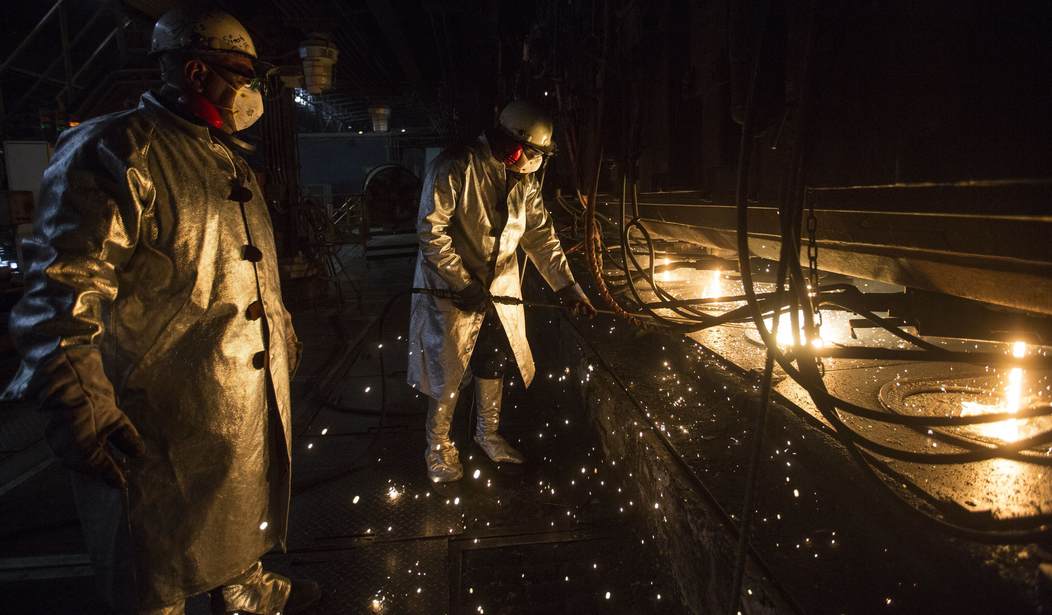The anti-carbon, green energy movement has infiltrated almost every aspect of life these days, to the point of seeming obsessive. But even with that in mind, a recent announcement from Mercedes-Benz in Germany this week caught me by surprise. They are partnering with Swedish steelmaker SSAB to begin the process of buying steel to be used in the manufacturing of their vehicles. But this steel will allegedly be different from the metal they’ve traditionally used. The steel from SSAB will be “fossil-fuel-free.” If you don’t normally associate steelmaking with fossil fuels, they actually are a part of the process. In order to melt iron ore sufficiently for industrial use, coking coal furnaces are used to raise the temperature to the required levels. But SSAB is going to do it with hydrogen and electricity. (Reuters)
Swedish steelmaker SSAB (SSABa.ST) said on Wednesday it had partnered with Daimler’s (DAIGn.DE) Mercedes-Benz to introduce fossil fuel-free steel into vehicle production, with prototype parts for body shells planned for next year.
SSAB plans to supply the market with fossil-free steel at a commercial scale in 2026, using the HYBRIT system to replace coking coal, traditionally needed for iron ore-based steelmaking, with electricity and hydrogen…
Mercedes-Benz expects that by 2039 its new passenger car fleet will become carbon dioxide-neutral along the entire value chain.
The technology being used to create this “green” form of steel is known as the HYBRIT system (Hydrogen Breakthrough Ironmaking Technology). You can read about it here, but the short version of the story is as follows. SSAB will still be melting down iron ore to make steel because that can’t be avoided. But instead of using a coking coal blast furnace, their furnace will be heated up by burning hydrogen.
That probably sounds great at first glance if you’re into all things green, but we’ve covered related issues here before and there are some significant questions that need to be answered. First of all, they can’t just dump iron ore into the furnace as is done in traditional plants. The ore first has to be converted into iron ore “pellets” at a separate factory. There’s the first step where the cost of the steel will be going up, along with the cost of the vehicles and other products the steel is eventually used in. Also, that manufacturing process is going to require significant energy. Where will they be getting that?
Once the pellets arrive at the HYBRIT plant, they are fed into the furnace which is then superheated by burning hydrogen, producing only water vapor as a byproduct. Again, that sounds wonderful if you’re an eco-warrior, but where are you getting the hydrogen from? We’ve discussed hydrogen as a fuel here in the past as a possible alternative fuel for vehicles. It’s a great fuel, to be sure, but the only scalable way we currently have to produce vast amounts of hydrogen is by splitting water using electricity. Now we’re back to the question of where you plan on getting all of that juice. The vast majority is still produced through oil and gas or nuclear.
I suppose it’s possible that the HYBRIT plant could produce enough electricity through wind and solar just to use to make hydrogen for these smelting operations. But if this technology is going to expand much further in volume, you’re still going to need more electricity to produce the hydrogen fuel than you’ll be able to crank out. Also, remember that it takes more electrical energy to split water into hydrogen and oxygen than you get back when using the hydrogen as fuel. It’s a self-consuming equation.
So is this really a “greener” way to make steel, or is it just more virtue-signaling that, in reality, just moves the nasty fossil fuels further away from the manufacturing process without eliminating them entirely? At least until more data is delivered from a fully functioning plant, I’ll be leaning toward the latter. Here’s a short film on how the HYBRIT system works.








Join the conversation as a VIP Member